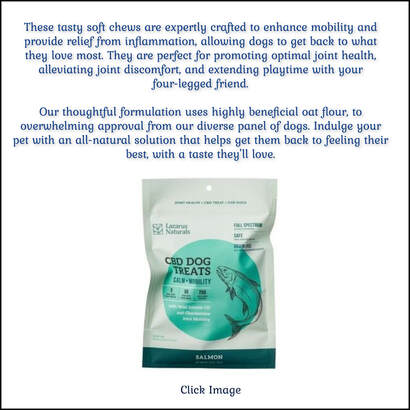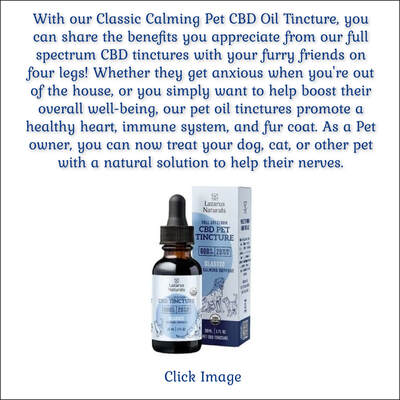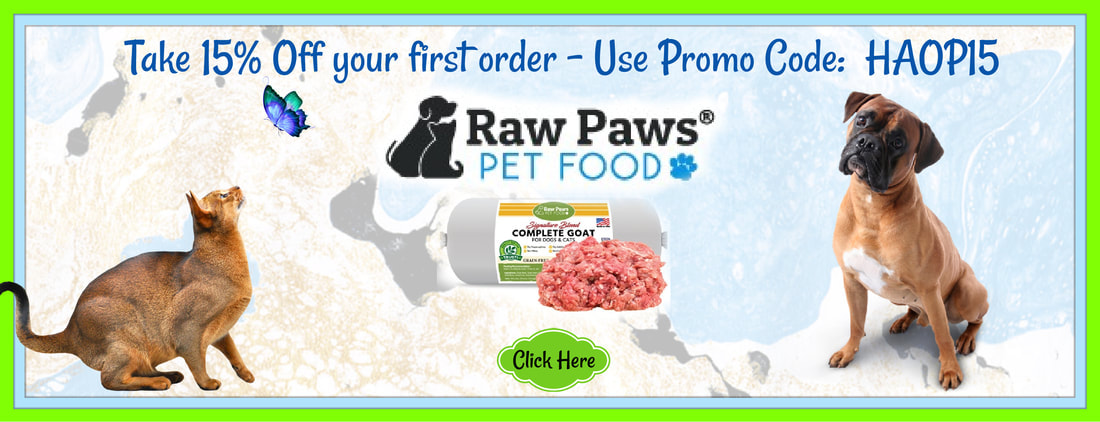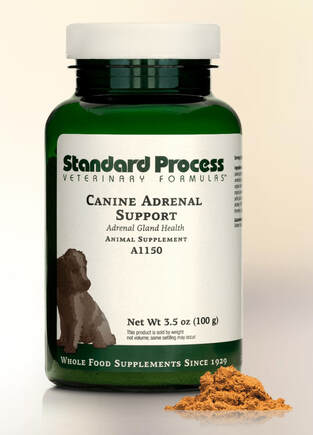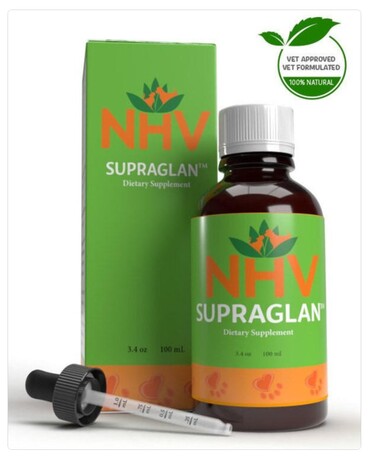
By VetInfo
Canine Addison's disease is also known as hypoadrenocorticism and it is caused by a deficiency of the hormones produced by the adrenal glands. In some ways, it is the opposite of canine Cushings disease, a condition in which the adrenal glands produce too much cortisol.
Addisons disease in dogs is believed to be caused by an autoimmune condition that causes the body to destroy its own tissue-in this case, the adrenal gland. Other conditions can, however, damage the adrenal glands and cause Addison's disease. Dogs who have cancer in other parts of the body may develop the disease.
Addison's disease causes a reduction in the production of aldosterone. This, in turn, affects potassium, sodium and chloride levels in the blood. Potassium may build up in the blood and cause irregular or slow heartbeat. In severe cases, dogs may become weak or go into shock.
Canine Addison's disease is also known as hypoadrenocorticism and it is caused by a deficiency of the hormones produced by the adrenal glands. In some ways, it is the opposite of canine Cushings disease, a condition in which the adrenal glands produce too much cortisol.
Addisons disease in dogs is believed to be caused by an autoimmune condition that causes the body to destroy its own tissue-in this case, the adrenal gland. Other conditions can, however, damage the adrenal glands and cause Addison's disease. Dogs who have cancer in other parts of the body may develop the disease.
Addison's disease causes a reduction in the production of aldosterone. This, in turn, affects potassium, sodium and chloride levels in the blood. Potassium may build up in the blood and cause irregular or slow heartbeat. In severe cases, dogs may become weak or go into shock.
While any dog can develop Addison's disease, some breeds are more prone:
Symptoms of Addison's disease include:
Untreated, Addison's disease can be serious. Consequences such as shock and kidney failure can occur suddenly.
- Portuguese Water Dogs
- Bearded Collies
- Standard Poodles
- Great Danes
- Soft Coated Wheaten Terriers
- Airedale Terriers
- Basset Hounds
- Springer Spaniels
- West Highland White Terriers
Symptoms of Addison's disease include:
- Repeated episodes of vomiting and diarrhea;
- Appetite loss;
- Dehydration;
- Rapid weight loss;
- General poor health.
Untreated, Addison's disease can be serious. Consequences such as shock and kidney failure can occur suddenly.
Diagnosing Addison's Disease
Your veterinarian will diagnose Addison's based on your dog's history and symptoms in addition to laboratory tests and adrenal function evaluation.
Confirming blood test results will show:
Adrenal function tests will measure the amount of cortisol in the blood. If it is low, adrenocorticotropin, an adrenal gland stimulating hormone, will be administered. Cortisol levels are then retested. If there is little or no response to the adrenocorticotropin, it can be assumed that your dog has Addison's disease.
Adrenal Crisis
A severe case of adrenal deficiency is a veterinary emergency. Intravenous fluids will be needed to restore normal levels of fluid, salt and blood glucose.
Your veterinarian will diagnose Addison's based on your dog's history and symptoms in addition to laboratory tests and adrenal function evaluation.
Confirming blood test results will show:
- Low levels of blood sodium
- High levels of blood potassium
Adrenal function tests will measure the amount of cortisol in the blood. If it is low, adrenocorticotropin, an adrenal gland stimulating hormone, will be administered. Cortisol levels are then retested. If there is little or no response to the adrenocorticotropin, it can be assumed that your dog has Addison's disease.
Adrenal Crisis
A severe case of adrenal deficiency is a veterinary emergency. Intravenous fluids will be needed to restore normal levels of fluid, salt and blood glucose.
Treatment for Addison's Disease
Once diagnosed, your dog will begin hormone replacement therapy. Regular veterinary visits will be needed in order to monitor hormone levels and adjust medications if needed.
Typically, your veterinarian will prescribe fludrocortisone acetate or Percorten-V. A short course of prednisone may be prescribed as well.
Diet to Battle Addison's Disease in Dogs
A well-balanced, high-quality diet is important for all dogs, but for dogs battling Addison's disease, it's especially important. Choose a brand that contains an easily digestible, named meat as its first ingredient.
Many dogs are allergic to common dog food ingredients. Look for foods that do not contain corn, wheat or soy.
Avoid foods that contain synthetic preservatives like BHT, BHA or ethoxyquin.
Once diagnosed, your dog will begin hormone replacement therapy. Regular veterinary visits will be needed in order to monitor hormone levels and adjust medications if needed.
Typically, your veterinarian will prescribe fludrocortisone acetate or Percorten-V. A short course of prednisone may be prescribed as well.
Diet to Battle Addison's Disease in Dogs
A well-balanced, high-quality diet is important for all dogs, but for dogs battling Addison's disease, it's especially important. Choose a brand that contains an easily digestible, named meat as its first ingredient.
Many dogs are allergic to common dog food ingredients. Look for foods that do not contain corn, wheat or soy.
Avoid foods that contain synthetic preservatives like BHT, BHA or ethoxyquin.
Supplements to Manage Addison's Disease
Consult with your veterinarian when choosing supplements for your Addison's dog.
Beneficial supplements may include:
Properly treated, canine Addison's disease can be managed successfully. Dogs with Addison's disease can lead long, full and active lives.
Consult with your veterinarian when choosing supplements for your Addison's dog.
Beneficial supplements may include:
- Multivitamin with vitamins C, E & A to support immune function
- Nettle, dandelion and spirulina contain vitamins and minerals that support adrenal function.
- Probiotic supplement to replenish beneficial intestinal bacteria and assist digestion.
Properly treated, canine Addison's disease can be managed successfully. Dogs with Addison's disease can lead long, full and active lives.
ADDISON’S DISEASE - NATURAL TREATMENT + PREVENTION
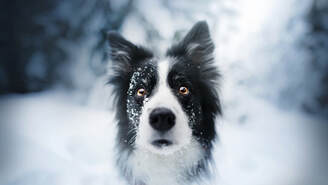
By Dr Dobias
HOW TO RECOGNIZE AND TREAT THIS SERIOUS DISEASE
Over the past few decades, there has been an alarming increase of dogs affected by a variety of diseases of the endocrine (hormonal) system in dogs, including adrenal gland problems.
If your dog's breed is genetically predisposed to this life-threatening disease or if your dog has already been diagnosed with Addison’s disease, this article is for you.
SUPERHEROES IN YOUR DOG'S BODY
The adrenal glands are hidden right by the kidneys and are truly the superheroes of the canine body. They help the body fight stress, viruses and bacteria and ensure the electrolytes such as potassium and sodium are in perfect balance.
Most people don't realize without properly functioning adrenals, the heart would stop!
TWO SIDES OF THE ADRENAL DISEASE “COIN"
Adrenal glands suffer from two opposing pathologies, hyper-function (Cushing’s disease) and hypo-function (Addison’s disease). Dr. Thomas Addison, an extremely talented and dedicated physician, discovered hypoadrenocorticism while working in central London Guy’s Hospital. In addition to discovering that hypo-function of adrenal glands can lead to serious and life-threatening diseases, he was also the person behind the discovery that vitamin B12 deficiency can lead to pernicious anemia.
HOW TO RECOGNIZE AND TREAT THIS SERIOUS DISEASE
Over the past few decades, there has been an alarming increase of dogs affected by a variety of diseases of the endocrine (hormonal) system in dogs, including adrenal gland problems.
If your dog's breed is genetically predisposed to this life-threatening disease or if your dog has already been diagnosed with Addison’s disease, this article is for you.
SUPERHEROES IN YOUR DOG'S BODY
The adrenal glands are hidden right by the kidneys and are truly the superheroes of the canine body. They help the body fight stress, viruses and bacteria and ensure the electrolytes such as potassium and sodium are in perfect balance.
Most people don't realize without properly functioning adrenals, the heart would stop!
TWO SIDES OF THE ADRENAL DISEASE “COIN"
Adrenal glands suffer from two opposing pathologies, hyper-function (Cushing’s disease) and hypo-function (Addison’s disease). Dr. Thomas Addison, an extremely talented and dedicated physician, discovered hypoadrenocorticism while working in central London Guy’s Hospital. In addition to discovering that hypo-function of adrenal glands can lead to serious and life-threatening diseases, he was also the person behind the discovery that vitamin B12 deficiency can lead to pernicious anemia.
WHO IS AT FAULT? THE GENERAL, THE CAPTAIN, OR THE SOLDIER?
The adrenal glands can be thought of as the body’s two soldiers who report to the captain - the pituitary gland in the center of the brain. The pituitary gland is like a 'hormonal thermostat' that continuously monitors glands and their hormone levels, including in the adrenal glands. If the levels are low, the pituitary gland (the thermostat) signals the adrenal gland to produce more adrenal hormones.
However, the hierarchy doesn’t end there. The hypothalamus, located in the center of the brain, is the endocrine system’s 'general' that governs the pituitary gland and how much hormone is produced.
That means dysfunction of 'the general' (the hypothalamus), 'the captain' (the pituitary gland), or the 'soldier' (the adrenal gland) can cause Addison's disease. If any of these elements don't do their jobs, there will be a lack of adrenal gland hormone.
The adrenal glands can be thought of as the body’s two soldiers who report to the captain - the pituitary gland in the center of the brain. The pituitary gland is like a 'hormonal thermostat' that continuously monitors glands and their hormone levels, including in the adrenal glands. If the levels are low, the pituitary gland (the thermostat) signals the adrenal gland to produce more adrenal hormones.
However, the hierarchy doesn’t end there. The hypothalamus, located in the center of the brain, is the endocrine system’s 'general' that governs the pituitary gland and how much hormone is produced.
That means dysfunction of 'the general' (the hypothalamus), 'the captain' (the pituitary gland), or the 'soldier' (the adrenal gland) can cause Addison's disease. If any of these elements don't do their jobs, there will be a lack of adrenal gland hormone.
SYMPTOMS
If you are like most people, reading any medical book makes you feel like you may have every disease out there. The diagnosis of Addison’s disease is often very challenging. The symptoms are usually non-specific and unclear, which earned Addison’s disease the title of a “great pretender.” This is why it is often missed.
Two key symptoms always make me think of Addison’s disease:
A fluctuating cyclic pattern of diarrhea that often happens after a period of increased stress.
Periods of listlessness and lethargy.
In the early stages of the disease, a dog may not seem sick at first, and the blood chemistry may appear normal. Later on, potassium and sodium levels creep away from each other, with potassium being too high and sodium in the low normal range.
Diagnostic labs around the world use different units; therefore, I will not mention the actual levels here. The reference ranges are usually listed in your dog’s results. Just remember that high potassium and low-normal or low sodium may mean your dog has Addison’s disease.
The adrenal glands regulate electrolyte levels in the bloodstream. The primary role of potassium and sodium is to regulate hydration and water balance between the intracellular and extracellular space. Heart and other muscle contractility is also dependent on very precise potassium and sodium levels in the bloodstream, and the heart can simply stop if Addison’s is severe enough.
If you are like most people, reading any medical book makes you feel like you may have every disease out there. The diagnosis of Addison’s disease is often very challenging. The symptoms are usually non-specific and unclear, which earned Addison’s disease the title of a “great pretender.” This is why it is often missed.
Two key symptoms always make me think of Addison’s disease:
A fluctuating cyclic pattern of diarrhea that often happens after a period of increased stress.
Periods of listlessness and lethargy.
In the early stages of the disease, a dog may not seem sick at first, and the blood chemistry may appear normal. Later on, potassium and sodium levels creep away from each other, with potassium being too high and sodium in the low normal range.
Diagnostic labs around the world use different units; therefore, I will not mention the actual levels here. The reference ranges are usually listed in your dog’s results. Just remember that high potassium and low-normal or low sodium may mean your dog has Addison’s disease.
The adrenal glands regulate electrolyte levels in the bloodstream. The primary role of potassium and sodium is to regulate hydration and water balance between the intracellular and extracellular space. Heart and other muscle contractility is also dependent on very precise potassium and sodium levels in the bloodstream, and the heart can simply stop if Addison’s is severe enough.
MOST COMMON CAUSES
People often wonder why Addison’s disease happened to their dog and if it could've been prevented. It would be nice to have a trivial explanation, but most diseases, including adrenal disorders are caused by a multitude of factors. To prevent disease, one has to look at as many contributing factors as possible. I also suggest that you take my Health and Longevity Course for dogs to better understand the connections.
ARE YOUR DOG’S GENES RESPONSIBLE?
Some people still believe certain genetic tendencies will express themselves no matter what, but many of these predispositions will never cause a disease if we address other predisposing factors. Here are some that play a significant role in the development of Addison's disease:
Processed food that causes nutritional imbalances, excessive toxin build-up and immune system stimulation, such as wheat gluten, starches, preservatives, fungi and molds in food.
Excessive vaccination overwhelms the immune system, which causes dysfunction and the body starts creating antibodies against its own tissue, including adrenal glands.
People often wonder why Addison’s disease happened to their dog and if it could've been prevented. It would be nice to have a trivial explanation, but most diseases, including adrenal disorders are caused by a multitude of factors. To prevent disease, one has to look at as many contributing factors as possible. I also suggest that you take my Health and Longevity Course for dogs to better understand the connections.
ARE YOUR DOG’S GENES RESPONSIBLE?
Some people still believe certain genetic tendencies will express themselves no matter what, but many of these predispositions will never cause a disease if we address other predisposing factors. Here are some that play a significant role in the development of Addison's disease:
Processed food that causes nutritional imbalances, excessive toxin build-up and immune system stimulation, such as wheat gluten, starches, preservatives, fungi and molds in food.
Excessive vaccination overwhelms the immune system, which causes dysfunction and the body starts creating antibodies against its own tissue, including adrenal glands.
|
Essential nutrient deficit - minerals, amino acids, omega oils, vitamins, and probiotics have a crucial role in the proper function of cells, organs, and glands.
Injury or congestion of the spinal energy flow, especially in the region of the third lumbar vertebra can compromise the adrenal glands. This section of the spine supplies energy to the kidneys and adrenal glands. Excessive stress or physical or emotional trauma, such as abandonment or abuse may predispose dogs to adrenal dysfunction. Breed predilection also plays a role in Poodles and Leonbergers, and Nova Scotia duck tolling retrievers are the most predisposed to Addison’s disease. American pit bull terriers, American Staffordshire terriers, Chihuahuas, cocker spaniels, golden retrievers, Lhasa Apsos, Schnauzers, and Yorkshire terriers are the least predisposed. |
THE UP AND DOWN ROLLER COASTER RIDE
Often, Addison’s disease is missed as the cause of lethargy, muscle weakness, exercise intolerance, low appetite, and digestive problems.
A dog with adrenal insufficiency (Addison’s) usually has repetitive patterns of being unwell, and then doing fine. The symptoms range from mild to very severe. When the adrenal glands lose the ability to produce adrenal hormones completely, this stage is called an Addison’s crisis and is life threatening.
The most significant change in dogs’ adrenal insufficiency is the shift in the levels of potassium and sodium. For an easier explanation, it is as if potassium and sodium are two repelling magnets. Their values move apart: Sodium is low, and potassium high. While some other blood chemistry parameters can go up and down by tens or even hundreds of units, potassium and sodium values that shift just by a few tenths of a unit can have serious, life-threatening consequences. Their precise concentration is essential to good health and life. That is why early and accurate diagnosis is so important.
Often, Addison’s disease is missed as the cause of lethargy, muscle weakness, exercise intolerance, low appetite, and digestive problems.
A dog with adrenal insufficiency (Addison’s) usually has repetitive patterns of being unwell, and then doing fine. The symptoms range from mild to very severe. When the adrenal glands lose the ability to produce adrenal hormones completely, this stage is called an Addison’s crisis and is life threatening.
The most significant change in dogs’ adrenal insufficiency is the shift in the levels of potassium and sodium. For an easier explanation, it is as if potassium and sodium are two repelling magnets. Their values move apart: Sodium is low, and potassium high. While some other blood chemistry parameters can go up and down by tens or even hundreds of units, potassium and sodium values that shift just by a few tenths of a unit can have serious, life-threatening consequences. Their precise concentration is essential to good health and life. That is why early and accurate diagnosis is so important.
DIAGNOSIS - STEP BY STEP
Blood work consisting of chemistry, complete blood count and thyroid values.
Urine examination.
An ultrasound to assess the adrenal gland size can be very helpful. Some practitioners reach immediately for the ACTH stimulation test. I like to do an ultrasound first because dogs with adrenal insufficiency usually have a small adrenal gland. Doing an ultrasound also helps to rule out other potential problems, such as tumors, pancreatitis, gall bladder issues or intestinal foreign bodies. I suggest having the ultrasound done under the guidance of a specialist. Some general practitioners have ultrasound machines; however, it takes time to acquire the proper skills to interpret the findings, and mistakes can easily be made.
The ACTH stimulation test usually confirms the diagnosis of Addison’s disease. It consists of measuring the cortisol levels in two blood samples. One sample is taken before and one after an injection of ACTH (adreno-cortico-trophin-hormone). ACTH is a pituitary gland hormone that stimulates the adrenal glands to produce cortisol. If the cortisol in the second blood sample is low, it means that the adrenals are insufficient and the patient has Addison’s disease. A single blood cortisol level test without running an ACTH test may be helpful, but a stimulation test is usually needed to confirm the diagnosis.
Blood work consisting of chemistry, complete blood count and thyroid values.
Urine examination.
An ultrasound to assess the adrenal gland size can be very helpful. Some practitioners reach immediately for the ACTH stimulation test. I like to do an ultrasound first because dogs with adrenal insufficiency usually have a small adrenal gland. Doing an ultrasound also helps to rule out other potential problems, such as tumors, pancreatitis, gall bladder issues or intestinal foreign bodies. I suggest having the ultrasound done under the guidance of a specialist. Some general practitioners have ultrasound machines; however, it takes time to acquire the proper skills to interpret the findings, and mistakes can easily be made.
The ACTH stimulation test usually confirms the diagnosis of Addison’s disease. It consists of measuring the cortisol levels in two blood samples. One sample is taken before and one after an injection of ACTH (adreno-cortico-trophin-hormone). ACTH is a pituitary gland hormone that stimulates the adrenal glands to produce cortisol. If the cortisol in the second blood sample is low, it means that the adrenals are insufficient and the patient has Addison’s disease. A single blood cortisol level test without running an ACTH test may be helpful, but a stimulation test is usually needed to confirm the diagnosis.


